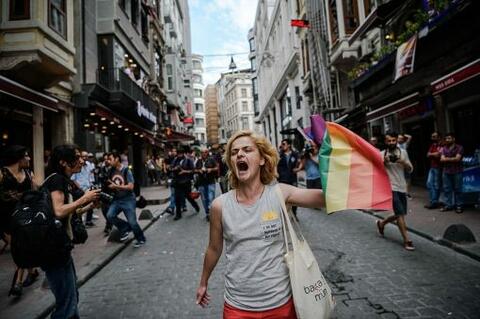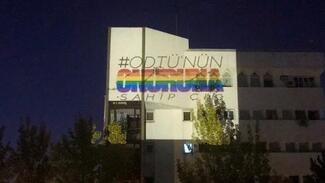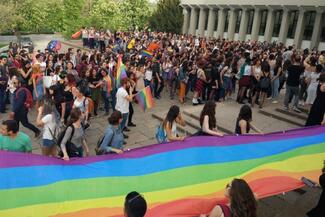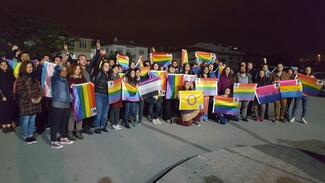
On 2 February 2021, Twitter took the still relatively unusual step of flagging a politician’s tweets for “hateful conduct”, the same thing it did to tweets from former US president Donald Trump before his ban.
Twitter’s target this time was Turkish interior minister Suleyman Soylu, who tweeted that “four LGBT+ perverts” had been detained for “inciting hatred”.
These LGBT+ “perverts” were actually students at Istanbul’s Bogazici University, where young people have been protesting president Recep Tayyip Erdoğan’s decision to appoint a loyalist with links to his ruling Justice and Development Party to serve as the prestigious university’s rector.
The clashes in Turkey escalated in February after protesters hung a poster on the campus that depicted the Kaaba in Mecca adorned with rainbow flags.
The Turkey protests were also the subject of an inflammatory and shameless attack on LGBT+ people by president Recep Tayyip Erdoğan on 1 February. During an online address to members of the Justice and Development Party (AKP), Erdoğan said: “We’ll carry our youth to the future, not as LGBT+ youth, but like the youth from this country’s glorious past,” adding to those listening that “you are not the LGBT+ youth. You are not the youth who vandalises, but you are those who mend those vandalised hearts.”
These are just a couple of examples of abuse and accusations levelled against LGBT+ citizens in Turkey, as a toxic stew of hatred and repression that has been steadily simmering for years starts to boil and bubble over in the wake of the student protests.
More recently, in September 2021, a traveller was told by a the Lujo Hotel in Bodrum, Turkey, that his booking for two men to stay in one room was not allowed.
Then there’s the appalling tale of Fabien Azoulay, a French Jewish gay man harassed, beaten and burned with boiling water in a Turkish jail by homophobic inmates.
Fabien Azoulay, 43, was jailed four years ago by the authorities for ordering a small amount of GBL while on a visit to Istanbul, unaware that the narcotic had been banned months earlier. After enduring years of abuse in prison, he was finally freed in August 2021.
But how did things get to this point, and what’s the history behind the current situation in the Islamic country as a whole, which Human Rights Watch has described as “a deepening human rights crisis”?
One thing to be aware of is that it hasn’t always been like this, in fact a newspaper in Turkey that published a column that described LGBT+ people as perverts, as Soylu did recently, was punished by a 4,000 TL fine in 2012, around £400. The columnist who wrote the article, Serdar Arseven, was fined 2,000 TL.
Then, on 17 July 2014, Turkey’s Supreme Court doubled down on that punishment, ruling that referring to LGBT+ people as “perverted” constituted hate speech. It was a positive sign, however, at the same time, the wider picture in Turkey was growing increasingly bleak.
After the anti-government protests of 2013, which began on 28 May 2013, initially to contest the urban development plan for Taksim Gezi Park in Istanbul, Erdoğan’s government imposed increasing censorship on the press and social media, which in turn put the brakes on Turkey’s EU membership application. A failed coup attempt in 2016 led to further purges and a state of emergency being declared.
It was against this tumultuous backdrop of increasing restrictions on civil liberties that Istanbul Pride was banned in June 2015, shut down through police intervention for the first time in its 13-year history. In 2016, it was banned again and arrests were made as participants tried to go ahead in defiance of the authorities. It was banned again in 2017, when police used rubber bullets and detained 10 people to suppress the event, according to the Turkish newspaper Hürriyet.
Also in 2017, Turkey’s capital city of Ankara followed suit, banning all LGBT+ or LGBT+ rights related events in 2017 under the pretext of providing “peace and security”, using the state of emergency as a precept.
The 27th annual Istanbul Pride was banned in 2019, along with the 7th Izmir Pride, the 3rd Antalya Pride and the 5th Mersin Pride Week.
Attempts to defy the bans were met with arrests and violence, for example in May 2019, Amnesty reported that authorities arrested 25 students during a Pride march at Middle East Technical University.
The Guardian spoke to a number of LGBT+ Turkish people in 2017 about the bans on LGBT+ self-expression, and they said that they were “fearful of what may follow”.
They told the Guardian that they thought Recep Tayyip Erdoğan was waging a war against them, and that they “felt a change in mood towards their community across the country – including in areas where they had previously enjoyed personal freedom.”
Idil, 25, who lives in a small city in southern Turkey said: “I wasn’t so surprised when I heard [the news]. I have participated in gay pride in Istanbul since 2009. The atmosphere was always really peaceful but, in the last years, it became a tour de force of the police. Brutal attacks have already given a clue about what we were going to experience. I think that this is just a start.”
Given recent events, the war on LGBT+ people that was signposted by worried Turkish people in 2017 certainly seems to be gathering pace. In recent days, the US State Department have formally condemned Turkey’s inflammatory anti-LGBT+ rhetoric.
State department spokesperson Ned Price told reporters on 3 February that the United States “strongly condemns the anti-LGBTQI rhetoric surrounding the demonstrations”.
“Freedom of expression, even speech that some may find uncomfortable, is a critical component of a vibrant, functioning democracy that must be protected,” Price added.


